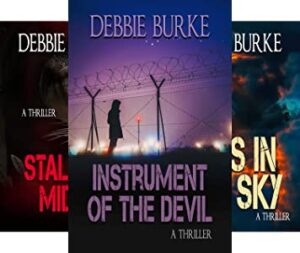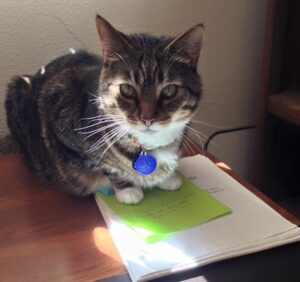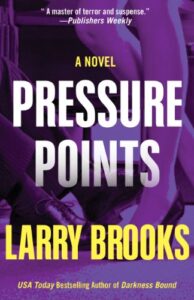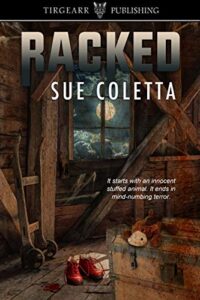 Today’s guest post is by my good pal, three-time Agatha award winner Leslie Budewitz. Recently I attended a talk by Leslie and a local lavender farmer that tied into the release of her new book, Lavender Lies Bleeding. From beta-reading the book, I’d already learned fascinating facts about that business. But being in a meeting room filled with lavender samples was truly intoxicating. Check out Leslie’s book for a fragrant reading delight.
Today’s guest post is by my good pal, three-time Agatha award winner Leslie Budewitz. Recently I attended a talk by Leslie and a local lavender farmer that tied into the release of her new book, Lavender Lies Bleeding. From beta-reading the book, I’d already learned fascinating facts about that business. But being in a meeting room filled with lavender samples was truly intoxicating. Check out Leslie’s book for a fragrant reading delight.
Take it away, Leslie!
~~~
The heart of the cozy mystery is the community. When a murder occurs, an amateur sleuth investigates because crime disrupts the social order. She embodies the world view that people are basically good, and one person can make a difference.
(Some cozy sleuths are male, but most are female, including my own, so I’ll use she and her.)
(And remember, these kinds of stories are called cozies because they involve closely connected people. There may be humor, ghosts, or recipes, but the crime and its impact are serious—and so is our sleuth.)
So how do cozy writers deal with villains? (Spoilers ahead. Oh, well.)
What’s the crime? In the cozy, the murder is personal. (A few cozies involve other major crimes or the threat of murder without an actual body.) There’s no random violence, no serial killers, no ticking bombs that could change the face of the planet. In other words, the crime is personal to the community—whether it’s the small town of Jewel Bay, Montana in my Food Lovers’ Village mysteries or a community-within-the-community, such as Pike Place Market and the Seattle food and restaurant community in my Spice Shop mysteries—so the connections between the story people are critical.
Who is our sleuth and what tools does she have? The cozy sleuth is an amateur, in the very best sense of the word—driven by determination to right a wrong. She may be new to town (Kathleen, the new librarian, in Sofie Kelly’s Magical Cats mysteries, or Blanche White, on a working vacation taking care of a wealthy family’s children in Blanche Among the Talented Tenth by Barbara Neely, a local girl come home (Erin Murphy in my Village series), or a long-time resident in a new situation (Pepper in my Spice Shop mysteries), but she is deeply committed to the community.
It’s that commitment, her personal stakes, that lead her to investigate. Mere curiosity is not enough.
Without access to search warrants, forensics, and other investigative tools, our sleuth does her work the old-fashioned way, using her personal skills and her knowledge of the community. She can ask questions the police can’t, make connections they don’t see. She may be able to see things others don’t because she herself is not seen, like Blanche. Often, she has specialized knowledge, such as the properties of particular spices, the origin of coffee beans, or the emotional value of a particular first edition, that aids her. Above all, she relies on her knowledge of human nature, of what drives people to extremes.
Who’s our victim? Look to the victim, Poirot said, and as usual, he was right. Identifying the victim’s secrets and relationships may point to one suspect or absolve another.
Who are our suspects? Again, look to the victim. The circumstances of the crime may narrow the search quickly, but it’s also important to look at the victim’s wider circle—her family, friends, neighbors, co-workers. The cozy typically involves 3-5 suspects—and our sleuth may be one of them, especially in the series opener. Each has to have had motive, means, and opportunity.
Who, our sleuth asks, would have wanted this person dead? Why? Could they have done it, given the likely weapon, the time and location, and other circumstances? What else is going on that reveals clues or motives? What are the suspects doing? How does our killer tip his hand, or put our sleuth in danger?
Consider Murder on the Orient Express: No, it’s not truly a cozy, but it’s a great example. Clearly, the killer was on the train, either in the snow-stranded car or with access to it. As Poirot asks questions, he is investigating the victim as much as his fellow passengers. He begins to get a sense of the man and what he did that made him a target. Poirot asks who had opportunity—who was in the adjacent cars, who was in the hallway when the victim was killed, who had access to his room, who had an alibi. All the while, he is learning more about the other passengers. As their interconnections emerge, he develops his theory of what happened.
What drives our killer? Given what I’ve said about the community and personal connections, you won’t be surprised that the motives are also personal. The killer may feel forced to act to prevent the victim from uncovering evidence of the killer’s past crimes, as in Murder at the PTA by Laura Alden, where the uncovering is literal. The killer may strike out to remove an obstacle to his goals, such as when an employee discovers her boss’s nefarious plan and threatens to speak out, in Crime Rib, my 2nd Food Lovers’ Village mystery. Or the killer might believe the victim is about to harm someone else, as in Sofie Kelly’s Curiosity Thrilled the Cat.
Other motives may be revenge, anger, jealousy, greed, a sense of betrayal, or an equally strong emotion. Self-defense and self-preservation can play a part. The killing may be planned or spur-of-the-moment—which may point to one suspect over another.
How does our sleuth identify the killer? Identifying the killer in any mystery is a mix of teasing out the motive, means, and opportunity. For the cozy sleuth, this means asking questions. Poking her nose where it may not belong, because she’s on a mission. Putting her safety—and sometimes that of people she loves—in danger. Irritating the police, now and then. By using the tools of her own experience. Erin Murphy, in my Food Lovers’ Village mysteries, left a job as a grocery buyer for a major discount chain to take over her family’s local foods market. Spreadsheets are second nature to her, and her Spreadsheet of Suspicion helps her keep track of what she knows and doesn’t know.
If the victim and any suspects are not local, what ties and conflicts could have led to their death? That’s key in Kelly’s Curiosity Thrilled the Cat, where the victim is in town for a festival—but it’s clear he’s been here before. In Barbara Ross’s Torn Asunder, the victim and some of the suspects are in town for a wedding at our sleuth’s business; other suspects are locals or newcomers. Our sleuth discovers that no one liked the victim—essentially a man who needed killing—before uncovering the real reason a new employee is in town, leading her to the killer.
The sleuth’s and killer’s circles may intersect or not, depending on the crime, but will be close. In Blanche Cleans Up by Barbara Neely, our sleuth is the cook in a powerful family’s home; she knows the family and who comes in and out of the house. In Ross’s Shucked Apart, Julia first meets her boyfriend’s poker buddy after a theft at her oyster farm; when the friend dies and Julia investigates, she meets people she hadn’t known—and also discovers unexpected ties to people she already knew that help her identify the killer.
It’s not uncommon to have a second, or occasionally a third, murder. That, of course, may shake up the suspect list, eliminating one suspect by making her a victim and another who was in jail or the hospital, and adding one who—well, you decide what he was up to. Those murders may happen on the page, or in the past. In The Shadow of Memory by Connie Berry, our sleuth discovers that old friends of our victim have died under mysterious circumstances. What was the killer after, and how did killing them help him get what he wanted?
It’s also possible to have multiple killers, whose goals may be separate or intersect. In Crime Rib, a visitor kills another visitor while a local kills another local. Both share a motivation: to eliminate someone who stands in his way. To solve the first killing, Erin has to figure out what the victim knew; to solve the second, she has to ask not just who killed this most likeable man, but who thought they would benefit from his death.
In The Marlow Murder Club by Robert Thorogood, three killers hope to avoid detection through the usual means—exploring who might have wanted the victim dead—by trading victims and killing on another’s behalf. Only when our trio of sleuths questions alibi evidence do they tumble to the truth.
Cozies may be “clean” in their avoidance of rough language and graphic violence, but there’s plenty of dirt going on. Suspects may be guilty of other crimes and misdeeds, even if only one is the killer. In To Err is Cumin, my 8th Spice Shop mystery, Pepper discovers that our victim, a disgraced chef she’d once tangled with, had uncovered a criminal scheme implicating several men involved in leasing space and equipment to restaurants. Any of them might have made a good killer. It takes Pepper some doing—and puts her at some risk—to discover who wanted the lid kept on badly enough to push our chef into the Ship Canal and leave him there.
And in Lavender Lies Bleeding, the 9th in the series, a woman and her brother-in-law have different reasons for targeting our victim and her business, a lavender farm. When the man screws up, the stakes rise and his sister-in-law steps in, the resulting murder fueled by anger, greed, and bitterness. Different motives, different crimes, making for a twisty plot that’s fun to unravel.
Some modern cozies follow a less typical structure, making for more variety in the villain’s motives and the sleuth’s approach. In Misha Popp’s Pies Before Guys series, our sleuth is a baker who goes after men who harm women. But before taking action, she has to investigate their crimes. Is our sleuth an angel of justice—or a potential serial killer?
In The Golden Spoon by Jessa Maxwell, set at a cooking competition at a Vermont country estate, each competitor has a secret or a reason to strike back. When a judge dies, those secrets and motives begin to surface, even without an amateur sleuth on the case. Ultimately, readers know who killed the judge and why, a killing utterly justified. The police blame the wrong woman, but we know what she did, and the punishment does fit the crime.
Ultimately, the cozy sleuth and killer will tangle—with words, actions, or both. The truth will out, and justice will prevail. Dinner might be late, even in a foodie cozy, but the taste will be oh, so satisfying.
~~~

Leslie Budewitz
Leslie Budewitz tells stories about women’s lives, seasoned with friendship, food, a dash of history, and a heaping spoonful of mystery. She writes the Spice Shop mysteries set in Seattle’s Pike Place Market, as well as the Food Lovers’ Village mysteries and historical short fiction set in her native Montana. As Alicia Beckman, she writes moody suspense. A three-time Agatha Award winner and past president of Sisters in Crime, Leslie lives in NW Montana with her husband, Don Beans, a musician and doctor of natural medicine.
Check out Leslie’s brand new release Lavender Lies Bleeding, the 9th Spice Shop mystery.


 Characters need personal growth to achieve their goals. If the character seeks to improve themselves in some way — at work, in relationships, or spiritually — or defeat the villain, their fatal flaw will often sabotage early efforts.
Characters need personal growth to achieve their goals. If the character seeks to improve themselves in some way — at work, in relationships, or spiritually — or defeat the villain, their fatal flaw will often sabotage early efforts.







 The Prologue of
The Prologue of  Please excuse my using an excerpt from one of my books. I searched my Kindle for other examples but couldn’t find any that jumped out at me.
Please excuse my using an excerpt from one of my books. I searched my Kindle for other examples but couldn’t find any that jumped out at me.
